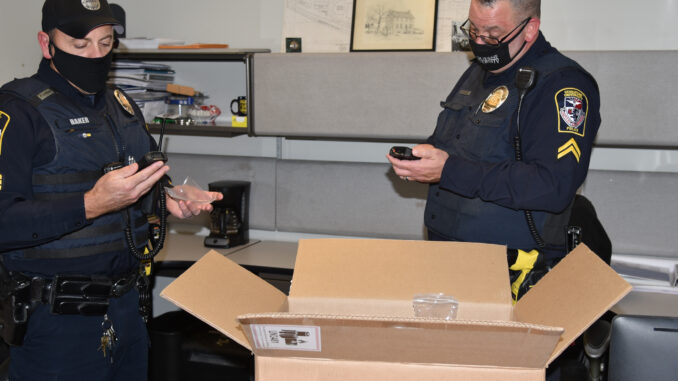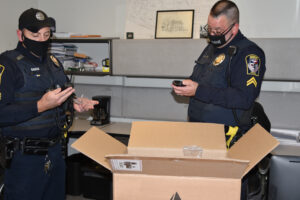
Kellen Stepler | editor-in-chief
10/29/2020

Duquesne Police officers open the newly delivered body cameras.
On Sept. 25, Duquesne University announced that they had purchased body cameras.
A little over a month later, the university announced that they have received those cameras this month, along with investing in a system that will equip all 40 public safety officers with those body-worn cameras.
“Since November 2017, the university has been researching how best to acquire and deploy body cameras, through a thorough and deliberative process during which we solicited input from a variety of constituents, including the expertise of [Duquesne law] Professor [John] Rago, a national expert in law and policy for the use of body cameras,” Duquesne spokesperson Gabe Welsch said.
The body cameras are one of Dannielle Brown’s, mother of Marquis Jaylen “JB” Brown, three demands of the university. Brown has been advocating for police reforms on college campuses since early July.
Rago will assist the program. He was a main source of the Pennsylvania Act 22 of 2017, which eliminated numerous legal barriers to enable police in Pennsylvania to wear body cameras.
“Support for our efforts is drawn from the experiences of state and local agencies who continue to provide us with critical guidance as we work draft policy that meets—and we expect will exceed—the needs and expectations of our community,” Rago said in the statement.
In collaboration with Duquesne’s Police union, the university is working on implementation details and policy-making practices.
“Cameras raise several considerations that the Department of Public Safety and the university will take into account, including the effects that cameras have on privacy and community relationships, concerns raised by frontline officers, expectations that cameras create, and other considerations. There are also basic software and technology components that need to be addressed as the cameras are deployed,” the statement says.
The statement notes that with a police department the size of Duquesne’s, it will take four to six months to craft, review and approve an appropriate department policy, training and full deployment of the system.
**UPDATE: On Oct. 30 at 3:27 p.m., this article was updated to reflect a quote from Duquesne spokesperson Gabe Welsch.




